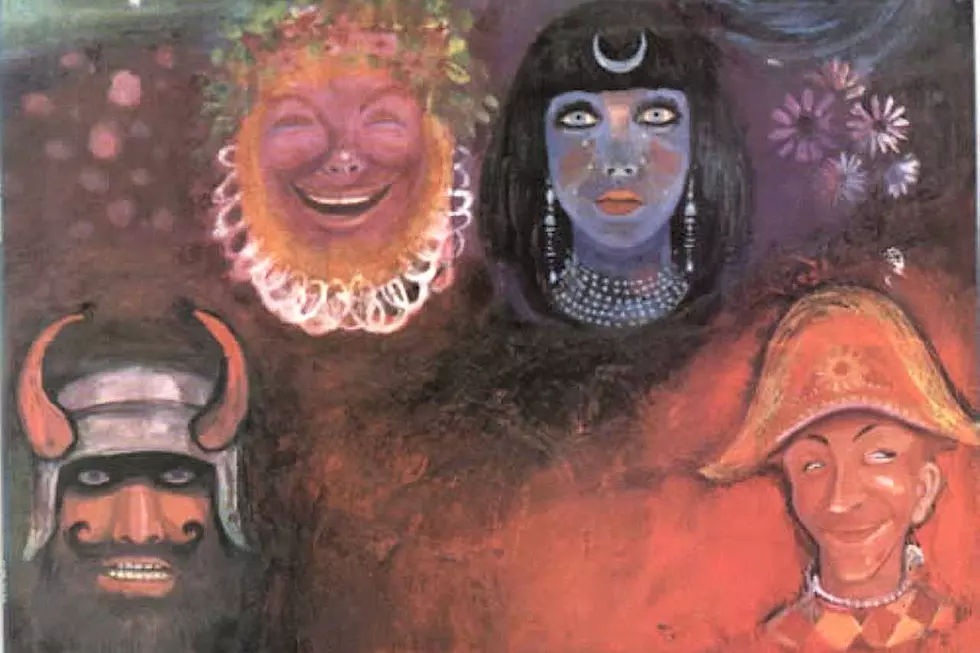
Why King Crimson’s ‘In the Wake of Poseidon’ Was Destined to Fail
King Crimson practically invented progressive rock with 1969's In the Court of the Crimson King. So, it was inevitable that their 1970 follow-up In the Wake of Poseidon would feel like a letdown.
Released on May 15, 1970, the album plays like a hazier mirror image of the band's earth-shattering debut, right down to the similarly worded title. Like Court, its songs combine jazz, psychedelia, folk and heavy rock into a hypnotic whirlpool, showcasing the experimental mindset of bandleader-guitarist Robert Fripp. But in a track-by-track comparison, Poseidon rarely stacks up: For most fans, it's second-tier Crimson.
Still, it's unfair to expect a masterpiece every time out – and after all, it's shocking In the Wake of Poseidon wasn't a disaster, considering the turmoil that defined its recording. Co-founding multi-instrumentalist Ian McDonald and drummer Michael Giles left the band in 1969, following King Crimson's first U.S. tour – and bassist-singer Greg Lake fled soon after to join Keith Emerson and Carl Palmer in the seminal prog-rock supergroup Emerson Lake and Palmer. With the future of Crimson appearing shaky at best, Fripp was even offered the guitar position in Yes after the departure of founding member Peter Banks.
Fripp's towering monument was eroding piece-by-piece, so he recruited a hoard of session players to flesh out a temporary studio lineup. Luckily, some of those hired hands happened to be his former bandmates. Giles and his bassist brother Peter -- who'd worked with Fripp prior to Crimson's founding -- hold down the rhythm section, with Michael once again dazzling with his intricate drum fills; Lake adds his husky voice to every track except the reflective ballad "Cadence and Cascade" (handled by Fripp's former bandmate Gordon Haskell); and recurring collaborator Mel Collins adds ethereal jazz elements with his sporadic woodwinds.
The highlights are some of King Crimson's best early work: "Pictures of a City," with Fripp's chromatic guitar runs and Collins' honking baritone sax, plays like a jazzier, funkier version of "21st Century Schizoid Man." The quirky single "Cat Food" takes a fusion-esque approach, quoting the Beatles' "Come Together" with its hypnotic bassline. Then there's the epic, symphonic title-track, one of the best Mellotron features ever recorded. But the low points – the meandering, dissonant "The Devil's Triangle," for example – keep this one just short of classic status.
Listen to King Crimson's 'In the Wake of Poseidon'
Poseidon was Lake's King Crimson swan song, but he almost wasn't needed for the LP. Though the fact's become a peculiar footnote in rock history, emerging talent Elton John was originally hired to sing on the sessions before Fripp changed his mind.
"Elton had been booked to sing all the songs on Poseidon for £250 as a session singer and as I wasn't familiar with his work, Mark Fenwick of E.G. [Records] gave me a copy of Elton's first album," Fripp wrote in his liner notes to the 1976 compilation A Young Person's Guide to King Crimson. "But his style didn't seem right for Crimson and the album was poor, so I canceled the sessions. Among those singers we auditioned were John Gaydon, one of our managers (the G of E.G.) who had sung with the Band of Angels, and [Roxy Music singer] Bryan Ferry. Both were among the best, although not suitable."
The reviews weren't as stellar for King Crimson's second album, though they did manage to pull out a couple backhanded compliments from notorious prog-hater Robert Christgau.
"For a long time I thought this was the worst rock band in history simply because it was the most pretentious, but sometimes pretensions are (at least partially) earned," the critic wrote in his brief review. "Their second album is more muddled conceptually than In the Court of the Crimson King, quite a feat. But they're not afraid to be harsh, they command a range of styles, and their dynamics jolt rather than sledgehammer (properly electric, that). Also, they can play: kudos to drummer Michael Giles and guitarist Robert Fripp, who also illustrates the old adage, 'Better a Mellotron than real strings.'"
King Crimson's jazz influence would come even further to the forefront on their next album, the polarizing but more adventurous Lizard – and the next chapter in a seemingly unending transitional period.
See King Crimson Among the Top 100 Live Albums
More From Ultimate Classic Rock









